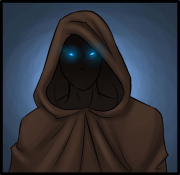|
Original Post for Context:A Dumb 19 year old posted:While I do have specific questions I would like to ask about GMing, I'd prefer it if this thread was a general "Help me be a good GM" thread. Welcome to the GM Advice Thread! It's been years since the thread has started, but it seems to keep kicking no matter how much neglect and abuse it takes. This is a great place to bring any questions or concerns you have about running games, problems running games, or what the hell to do with those drat mary sue characters you keep infesting your games with. While I don't consider myself to be a great GM, I consider a lot of the philosophies harbored by TradGoons to be very, very fundamental to a fun and successful game. If you're totally new to Pen and Paper games, you've come to the right place. If you're a seasoned vet to this whole dungeon-mastering business, your advice and input is more than welcome.  Some Quick Discussion Links For Those Who Just Wandered In (in Chronological Order) Some Quick Discussion Links For Those Who Just Wandered In (in Chronological Order) A Discussion on Open World GMing: All Roads Lead to Rome Player Involvement Within Combat Encounters: Click to View Cinematic Worldbuilding and Removing the Stigma of Necromancy: Arise! Running Games for the Totally New (NWOD) What does this button do? Foreign Languages in a Campaign Setting Ano! On Character Voices It Can't Be Any Worse than Deep Fear What to do when your players go out of control And how to avoid becoming a controlling GM Project1 asks about the nature of running a sandbox game And some interesting concepts are brought forward Masterplan: A very handy campaign organization tool. Also great for 4th Edition D&D Encounter creation. Softrope: Suggested by Ritorix A sound mixer designed for Dungeon Masters. You can use it with soundtracks and sound effects to create a very nice atmospheric effect for your players. Link AutoRealm: Suggested by Guesticles A program for building world maps. Link Obsidian Portal: Suggested by RicochetD20 An tool used to organize your campaigns online, for all to see. Link  Music, Artwork, Etc. Music, Artwork, Etc. Freesound.Org: Suggested by Ritorix A killer website that contains a nifty selection of sound effects, useful for any DM that wants to up their game a notch. Link NIER: Very Dark soundtrack (with a few exceptions), and it's all in a made up language (minus one song) so the lyrics won't distract anyone. There are some tracks that come with intense and dramatic versions, so you can use them as a theme if that's your thing. Link Bastion: A somewhat well played soundtrack with very industrial/western sounds. Also great for the open road Link Arrrthritis fucked around with this message at 21:52 on Jun 29, 2019 |
|
|
|

|
| # ? Apr 23, 2024 09:25 |
|
Arrrthritis posted:I've also noticed that in every campaign we've played, the have been literally NO puzzles or riddles, or even conversational roleplaying. The DM just didn't like to do any of it. So, as a first time DM, should I take my chances with this group and incorporate some of those elements? Would I be better off running a combat-oriented campaign? This seems like something that you ought to ask your players directly. It'll save you a lot of grief just to learn what they want beforehand.
|
|
|
|
I'd suggest going with something simple for your first outing. Definitely ask them what sorts of things they're interested in, like Bass Concert Hall suggested. If they just want to kick rear end and take names, shoving a bunch of skill tests (or puzzles that the players have to solve) at them will just be an annoyance. If you want certain encounters to take place, design them loosely and simply. That way you can drop them in and flesh the details out on the fly. A damsel in distress, menaced by five kobolds, could be up a tree in a rural environment, trapped in a dungeon cell, or down a dank alleyway. Don't expect to use all of your set-piece encounters unless you're doing a straight-up dungeon crawl with no meaningful side passages. CR is a pretty decent scale at low levels, but it starts to show wear in the teens. It's worse when you've got people experimenting with multiclasses and prestige class mixing, but by that point you should have a decent grasp of their strengths and weaknesses.
|
|
|
|
Arrrthritis posted:Finally, any other tips or bits of wisdom would be appreciated. While I do want my campaign to end up the way I want it to, I also want the players to have a good time role-playing and overcoming some of the challenges beset them. If that's out (and it really shouldn't be, even if it means Think an average Orc War Party's campsite. It could be boring, just run in, wizard flings in some spells while the fighter closes to full-attack range. Or pepper in a standard that's blessed by Gruumsh flying over the camp that gives -2 to hit for non-orcs in a 30' aura around it. And the war party is riding giant cockroaches instead of worgs (use the same stats, just call them roaches), so they made camp next to a marsh so the roaches could feed - Boom! instant slowing terrain from the encroaching swamp. There might be an orc lookout or two in the trees, but what if the camp's been there a while and there's a network of rope ladders and swings so the ranged orcs can pepper death down on their foes - and the ranger/rogue can go up there and chuck orcs off of the catwalks to their death.
|
|
|
|
tendrilsfor20 posted:Tip 1 would be use 4th edition because it's soooo muuuuccchhh better for DMing. Seriously, I used to be really aggravated trying to build meaningful encounters, but now it's like "booyah!" I really would like to give DMing 4th edition a shot, but unfortunately half the group is a much bigger fan of 3.5. I personally think that Fourth is better and more fun, but the group has a much varying opinion of 3.5 ranging from "money grubbing whores" to "Pretty loving sweet." Bass Concert Hall posted:This seems like something that you ought to ask your players directly. It'll save you a lot of grief just to learn what they want beforehand. I was going to do something where they had some sample riddles and puzzles for a couple side quests, but it's probably a lot simpler to just ask the players up front. Bieeardo posted:If you want certain encounters to take place, design them loosely and simply. That way you can drop them in and flesh the details out on the fly. A damsel in distress, menaced by five kobolds, could be up a tree in a rural environment, trapped in a dungeon cell, or down a dank alleyway. I was going to have the encounters be in a "Schroedinger's Dungeon" sort of sense- where they're both there and not until the party becomes an observer. Could this work? Would I be better off designing what I want them to encounter, but not where?((assuming all theory arguments are null and void and the monsters do not count as an observer)) Thanks for the advice! You guys have been great so far.
|
|
|
|
In my opinion, designing the 'what' and filling the 'where' in on the fly would be easier. It's good practice for thinking on your feet, for when your players inevitably decide to dash off on a tangent, and helps the players to feel that they aren't being railroaded. They rabbit off in an unanticipated direction, but still end up getting the encounters/treasure/information that you want to give them. A straight-up dungeon crawl is a somewhat different matter. You have stricter control of the environment than in an urban or overland scenario, so the PCs are less likely to run off to the nearest tavern or toward the coast instead of the mountains. Your 'Schroedinger's Dungeon' sounds like how a lot of basic crawls work out: each room is an encounter unto itself, with monster positions pre-placed and no communication between rooms to confuse things. In that kind of a situation, you'll have an easier time relying on the PCs' greed or completionism to scour the whole map for everything you've set out.
|
|
|
|
Arrrthritis posted:I really would like to give DMing 4th edition a shot, but unfortunately half the group is a much bigger fan of 3.5. I personally think that Fourth is better and more fun, but the group has a much varying opinion of 3.5 ranging from "money grubbing whores" to "Pretty loving sweet." Run what you want to run. If you think your game would work better in 4e, the people who have a vendetta against it don't need to play. Don't let players control your game. If they like 3.5 so much they can run it, you are under no obligation to do so. quote:I was going to have the encounters be in a "Schroedinger's Dungeon" sort of sense- where they're both there and not until the party becomes an observer. Could this work? Would I be better off designing what I want them to encounter, but not where?((assuming all theory arguments are null and void and the monsters do not count as an observer)) That works wonderfully, just don't let them catch you. I frequently move things around, and not in a railroady sense. More like 'they decided to go out to the old mill instead of stay at the inn and now I won't get to let them see my cool ghost...I'll just move her over to the mill instead.' My general advice is to give the PCs a situation and see what they do with it. 
|
|
|
|
Arrrthritis posted:
I'd be willing to say 90% of DM's do this if not more. losing a cool battle idea sucks if they decide to go off what you thought they would do (not that it's their fault, it's "their" game). Plus events are generally occured in such a way that they are reliant on the PCs arriving to occur. How often do you happen to show up seconds before the evil ritual is complete? It's not interesting if you catch him in his sleep, and most DMs arent going to have them show up after unless it gets excessive.
|
|
|
|
Arrrthritis posted:I was going to have the encounters be in a "Schroedinger's Dungeon" sort of sense- where they're both there and not until the party becomes an observer. Could this work? Would I be better off designing what I want them to encounter, but not where?((assuming all theory arguments are null and void and the monsters do not count as an observer)) I'm not sure I'm getting quite what you're saying, but that sounds somewhat complicated. For your first time GMing, simple is much better than complicated. If you're able, try running a few one shot pre-published campaigns to get a feel for how the game works. That's what I'm going to do with the Paranoia games I'm going to be starting, because nobody has played the game before
|
|
|
|
Cyrai posted:I'm not sure I'm getting quite what you're saying, but that sounds somewhat complicated. For your first time GMing, simple is much better than complicated. If you're able, try running a few one shot pre-published campaigns to get a feel for how the game works. That's what I'm going to do with the Paranoia games I'm going to be starting, because nobody has played the game before Basically using what has been said above, if he has a ghost encounter planned in a basement and the party doesnt go there, he moves it to the mill instead. If the ghost had an accident in the basement and died, but they dont go there, so he says it fell off the mill and died instead. As long as the players dont get wise to this (i.e. you tell them the ghost died in the basement but it shows up at the mill anyway) its a good idea.
|
|
|
|
RagnarokAngel posted:Basically using what has been said above, if he has a ghost encounter planned in a basement and the party doesnt go there, he moves it to the mill instead. Yeah, that's definitely a good way to plan things. The 'there and not-there' bit threw me off; it sounds like something complex that I would do that never comes anywhere close to what I envisioned, and only sometimes comes close to being good
|
|
|
|
It's also good to keep in mind that you're not writing a Novel, or a TV show, or a Movie, even if you roughly plan for it to turn out like one. Obviously you want some drama and excitement, cool poo poo going down, but the trick is that usually it's the heroes who are doing said cool poo poo - saying the memorable lines, making the heroic decisions, or coming up with a genius plan at the last moment - and that's the one element you don't have any control over. Imagine if an author had no control over the protagonists, only the settings and villains. It's really hard to make those awesome scenes you might be imagining happen if you just flat out don't know whether the hero is going to swing in dramatically at the last minute or not. You can do it through cheesy rail-roadish hints "Well, you do have the rope in your hand... you could swing down there..." but that's pretty lame. So just kind of to echo what people have been saying already: Present the players with some cool scenarios, but be prepared for them to do the complete opposite thing that you were imagining them to do and roll with it. That's kind of half the point of these games, anyway. If they always just responded exactly how you wanted, then honestly, what do you need them around for anyway? The story that you wind up with at the end of the night doesn't have to be perfect, you're not trying to sell it to anyone. It's a lot like Improv Comedy, it doesn't have to be a perfectly crafted and researched joke to get a laugh. Something about the fact that it's being created on the spot makes it resonate even if it's not completely formulated and proven to be funny.
|
|
|
|
Joudas posted:So just kind of to echo what people have been saying already: Present the players with some cool scenarios, but be prepared for them to do the complete opposite thing that you were imagining them to do and roll with it. That's kind of half the point of these games, anyway. I remember one game (as a player), where we were breaking up a cult resurrecting their dark lord. We busted in on them as they were pulling the ancient evil sarcophagus out of its tomb with a rope and pulley. The elf said, "I want to shoot the rope and have the coffin crash back into its pit." DM said, 'Sure, gimme a roll.' Sure enough, we made the cultists stop their ritual and sidestepped a big fight. The DM later was like, "Well, that could've been a cool fight, but you guys handled it fine, soooo..." And we still talk about it to this day as "the day an elf cut a rope with an arrow." So basically what I'm saying is, let the players try anything, and if it's cool, don't get flustered, just be like, "Yep. Ya got me, you win." and move on to the next encounter. Of course, it never hurts to have "reinforcements" show up if the fight isn't going the bad guys' way, too.
|
|
|
|
One of the past DMs I had always had a knack for having only one solution to a problem. If there was a band of pirates about to raid a village- you had to protect the village. When asked "Well, couldn't you leave before they attack?" they would reply "But we love this land." or when thinking "We could intercept the pirates before they strike." he would reply "But the villagers want to fight, too." Which really didn't make much sense. Starting out, it seemed fun, but as the sessions dragged on and the story got more and more tediously dull, I thought "There's got to be a better way to do this." I quote him on this, but he always said that he "doesn't understand the notion of someone changing opinions." So in every case negotiation was nigh impossible- Diplomacy was 30 minimum. I want to craft a campaign where, if the adventurers chose to defend a village being raided by pirates, they could convince the villagers to leave, they could fight the pirates head on, they could intercept the pirates head on, they could kill the villagers and join the pirates, or whatever half-baked plan they wanted to do. I want this to be a game where thinking out of the box gets you rewards and can help make a normally difficult situation much easier. How does 3.5 deal with kicking someone into a fire or causing a boulder to fall on someone? Should I incorporate designs in dungeons where players could use the environment to their advantage, or should I just stick to the basics and keep it to sword on shield action? One other thing: It's already set in stone that we're going to do 3.5. While I agree that 4 is a good system, we don't have the patience to learn a new system as we go along with a new GM. 3.5 is a system we're all very familiar with and I won't have to deal with sessions of people interrupting with "That's such bullshit." after I tell them that a kobold dies after the first swing. tendrilsfor20 posted:
That's exactly the kind of thing i'm talking about.
|
|
|
|
It sounds like you've got a great philosophy going in, which is fantastic. I would still suggest making things simple at first, until you're sure of yourself behind the GM screen. With the fine line between life and death at low levels, they're not the best place for experimentation. Environmental props? Sure, toss 'em in. Mention them when you describe the PCs opening up a door, or just run with it if one of the players asks if there's a chandelier in the room. Mention that you're trying to encourage unusual tactics and thinking outside of the box, but don't force them into it. If they want to rush in with swords flashing, let 'em. You can always have one of the bad guys knock a brazier over onto a highly flammable rug...
|
|
|
|
Arrrthritis posted:How does 3.5 deal with kicking someone into a fire or causing a boulder to fall on someone? Should I incorporate designs in dungeons where players could use the environment to their advantage, or should I just stick to the basics and keep it to sword on shield action? Also, don't forget "the DM's best friend," a situational +1 or +2 modifier, handed out to players who attempt some bit of derring-do that seems cool. Make sure to make a point of letting the table know, something like, "That's such an awesome idea, you get +2 to try it, hope it works... ROLL!" Arrrthritis posted:One other thing: It's already set in stone that we're going to do 3.5. While I agree that 4 is a good system, we don't have the patience to learn a new system as we go along with a new GM. 3.5 is a system we're all very familiar with and I won't have to deal with sessions of people interrupting with "That's such bullshit." after I tell them that a kobold dies after the first swing.
|
|
|
|
Here's an example encounter i'd want to run by to see if it's decent enough to pass as a challenge. The party, which consists of a level 1 barbarian, bard, and sorcerer, busts into a condemned church full of orcs. ((6 in the immediate and more downstairs.)) In the center of the room there's a pile of debris, while along the sides of the room are some wooden statues of Gruumsh's heroes ((if the spot roll is good enough)) that are propped up fairly poorly. ((if asked)) the statues are big enough that they could at least impede the orcs. ((if asked)) Along the ceiling are a series of lanterns, supported by ropes and keeping the church at a dimly lit state. In case I didn't make my question clear- would that be an encounter i'm hoping for? Challenging enough to warrant outside thinking, without being too hard to require it? Vv I would like to request that the whole 4 vs 3.5 discussion be ended in this one case. While 4e is a good system and has it's perks. I, and the group, are much more familiar with 3.5 and I want my ability as a GM to be measured by my ability, rather than "Yeah, it was alright but fourth edition SUCKS man! gently caress Capitalism!" That, and the group can get sidetracked by a book rule they don't particularly like. vV Arrrthritis fucked around with this message at 06:45 on Jun 9, 2009 |
|
|
|
Cyrai posted:For your first time GMing, simple is much better than complicated. If you're able, try running a few one shot pre-published campaigns to get a feel for how the game works. I'm going to have to agree with this whole-heartedly. I started running a 4th edition game lately, my first time running anything in a live setting. I've made my own general plot but for the time being I am working with stuff from Dungeon Delves and Dungeon magazine when it comes to encounters and the adventures. It's helping me to get inspired when it comes to designing my own unique, fun encounters. It's also helped to show me what is an appropriate level of preparedness. There's a thing in the 4th ed DMG that says something to the effect of being able to say yes. Build on what your players do, don't prohibit. It only took a little bit of practice for me to be capable of fielding most of the surprises the players have thrown at me, when I kept this in mind. quote:The party, which consists of a level 1 barbarian, bard, and sorcerer, busts into a condemned church full of orcs. ((6 in the immediate and more downstairs.)) In the center of the room there's a pile of debris, while along the sides of the room are some wooden statues of Gruumsh's heroes ((if the spot roll is good enough)) that are propped up fairly poorly. ((if asked)) the statues are big enough that they could at least impede the orcs. ((if asked)) Along the ceiling are a series of lanterns, supported by ropes and keeping the church at a dimly lit state. This sounds like a pretty cool encounter. You could also have the statues be made of stone, with a strength check to push them over onto someone. It could do damage and knock the target prone, while the debris from breaking them makes crossing that area more difficult. You might even make it possible so that the lanterns, depending on the kind of lanterns they are, could be knocked down and start a fire, by either the orcs or the party. Fiiiinally, I also agree with Tendrilsfor20 a lot. If you can talk them into giving 4th a shot, do it. It's much, much easier on everyone and making really cool encounters that are dynamic and unique without a whole lot of work are a real selling point on it.
|
|
|
|
Yea, don't worry about the 4E thing. It would be a help, but seriously, it sounds like running 3.5 will go smoothest for your group. The last thing you want to do is start thing off on the sour note of "Well, I don't really like 4E but if you really want, I'll try it." That sort of simmering distaste will kill a game. Anyway, here are a few of my lovely tips on GMing: First, overprepare. Don't just prepare one session, prepare three sessions. Don't just prepare one town, prepare it and all the surrounding towns. Write down a list of dozen NPC names for each race and gender. Stat up some generic NPCs of any major class the players might encounter. Have a list of generic plothooks cribbed down somewhere. When I used to be lovely at improv, I found that I could usually compensate by just doing tons of extra work. None of it is really ever wasted either, you'll find that the more preparation you do, the more ideas it will give you, and more often than not, even if your players never get to an encounter one session, you can usually quickly redesign it for another session. Secondly, don't be afraid to constantly look for input from your players. The most basic approach is the overt one; just ask them what they want to play. More grognardy GMs will say, "It's your game, just run what you want." Seriously though, that's retarded. Tabletop gaming is a shared experience, and even if you're putting in a lot more work than the players, you can't act as if you own the game. You can also take a more subtle approach and find out what they want by looking at all the small hints the players give you without even knowing it. If you tell them to roll up a bunch of lvl 1 characters and they all come to you asking if there's any way they can play some bullshit +8 LA race, that's probably a sign that they want to play a higher lvl campaign. If all the characters they submit to you are utility spell wizards and fast-talking rogues, they're probably looking for a more deep-thinking involved game with less hack and slash. If you always find them ignoring your planned quests and such, it's probably because they're boring. Thirdly, feel free to constantly give the players your input. Again, PnP RPing is a shared experience, and sometimes it's helpful for the players to know what your intentions are. If you're hoping to run a more classic adventuring game where they all play selfless heroes, tell them and emphasize that that's what they should try to RP. So long as it's a fun idea, players are generally willing to roll with it. More than that though, if you leave your players in too big of a sandbox and don't provide any direction, they'll usually just get lost and bored. There's all sorts of other BS nuances to good GMing, but really, so long as you maintain some good communication with your players and aren't afraid of doing some extra work, you'll nail 90% of it down.
|
|
|
|
Here's a fun one; I've DM'ed for awhile in many systems and across several editions, but always to people my own age. Teen camp just started (ages 10-13), and I bought the D&D 4e Starter Set just for giggles because it was on sale anyways and I wanted more variety for the kids during the extended care time. Well 4-5 of them were half mocking it but half leafing through the booklets with interest, the little tokens, maps, etc, but even the basic rules are waaay beyond them and within a few minutes just kind of left it alone. I think I might try to run a short game during the week for them to see if they really do enjoy it or become interested, but gently caress if I know the simplest way to do it. It comes with the character sheets so if anything I was thinking of a one shot or two, all the math is done for them but I don't know how to convey the whole "do whatever you want" thing, since these kids are so brought up on electronics and not PnP/"imagination". Any suggestions?
|
|
|
|
So I'm looking for some GM advice: Just started a new 4E campaign, with the PCs as escaped gladiatorial slaves. They're going to shortly make their way to a small town founded by other escapees, which is dedicated to freeing other slaves. The main overall campaign goal will be to go back to the city that enslaved them and to liberate it/depose the tyrant ruler. Since the town is small and the PCs are only 5, they'll obviously need allies to wage such a war. The bulk of the campaign will be going to other regions to recruit allies. Is it too railroad-y to limit the information given to them about where prospective allies are found? For example, I would rather they go to the desert to recruit nomad horsemen so that I can throw a cool-rear end brown dragon fight at them earlier rather than later. On the other hand, I'd rather they not go to the swamplands until level 10 or so. What do you think? As the PCs don't know the region that well, they'll be looking to an NPC for ideas on where to find allies.
|
|
|
|
That is extremely rail-roady. Understand the players may have fun but the tone and plan you have of giving info out a little at a time to put them where you want is by definition a railroad. For 4e that's needed a little and in small doses pertaining to story it's fine, but an entire campaign based on the premise may put off some of the better players who are used to more experienced DM's with a knack for not doing railroaded campaigns. That being said, if they are new players to 4e or new to RPG's in general then you'll need to have a bit firmer and concrete plans for a slight railroad to help them learn the ropes, options, etc.
|
|
|
|
Fenarisk posted:That is extremely rail-roady. Understand the players may have fun but the tone and plan you have of giving info out a little at a time to put them where you want is by definition a railroad. For 4e that's needed a little and in small doses pertaining to story it's fine, but an entire campaign based on the premise may put off some of the better players who are used to more experienced DM's with a knack for not doing railroaded campaigns. Does it matter if I give them 3 out of 6 options, rather than 1 out of 2? I meant to communicate that fact. Also, they are all new to 4E, and I have one brand-new roleplayer as well. Mainly, I can't really think of a lot of other things for them to do, but hopefully they'll think of some things for me. Really the only other idea I had was having them infiltrate one of the main villain's strongholds in an intelligence-gathering mission. Again though, if they don't think of that, I'll have to tell them to do that. I feel like if I don't give them impetus to some degree, they won't end up doing much, but I don't want to always have to tell them where to go/what to do.
|
|
|
|
Fenarisk posted:That is extremely rail-roady. I like the idea (open world, go anywhere, do anything in any order); it's really not hard to scale any monster to any level (pp 178 in the DMG shows you the exact breakdown), just a little bit of work. I would play up the "escaped slave" angle to impress upon them that they have *nothing* to their name, no home, no food, etc, and that they should start by building a homebase nearby to radiate out from. That gives you a chance to see which environment they're going to first, and build that one - not that you shouldn't have each designed a little bit ahead of time.
|
|
|
|
FordCQC posted:I feel like if I don't give them impetus to some degree, they won't end up doing much, but I don't want to always have to tell them where to go/what to do. Don't forget to have shady halflings offer to show them a shortcut, for a price. We take for granted what 1700 miles looks like since we have cars/planes, but just getting to this treasure could be a campaign in itself, and have the PCs helping people/gathering allies along the way. And of course once they get there, they can use the riches to finance their war against their former captors. Shrecknet fucked around with this message at 19:03 on Jun 9, 2009 |
|
|
|
GMed my first session, it was glorious. The party didn't turn out as expected ((One of the players wanted to be a lumberjack, he's newer than I am so I was like "start with ranger, make a prestige class and I'll yay/nay it")) While the more experienced players rolled up a barbarian and a bard. Cue the lumberjack player starting up unforgotten realms. While i'm not a big fan of the series, hearing the line "Who's going to wrestle a bear when it tries to take your girl? A barbarian? A bard? No! A loving lumberjack!" made everyone crack up. While at first it was kind of slow getting the players to interact and explore, a great moment spurred when I was describing the entrance to a throwaway dungeon. "Your investigation of the cult has led you to a two-story wooden building, where you can hear some murmuring inside. What do you do?" The ranger was first to interject "You say this building is made of wood?" "Yeah." "I'm going to set that bitch on fire." "Okay, how do you want to do this?" "I'm going to sneak around the building and dump oil around the sides, then set the oil on fire" "Roll a move silently." *Player rolls, gets a 24* *I roll a couple of dice to determine if the cultists notice or not, they fail miserably* "While the fire starts out small and easily escapable at first, What you believe to be the cult inside failed to notice the flames quickly engulfing the building around them and blocking off any available passages. Eventually, the flames weaken the supports of the building such that the second story collapses on some of the occupants inside." And here I was thinking that knocking over statues was out of the box.
|
|
|
|
Arrrthritis posted:GMed my first session, it was glorious. Way to go, that's a good use of the "Yes and..." style of GMing. Did they find the dungeon entrance, or are you gonna save it for another location. (Nothing beats searching for loot and finding a whole freaking dungeon.)
|
|
|
|
The players didn't do anything loot-wise, I guess they figured it all got destroyed by the building/fire. I figure if they do return to the building and search for loot, the dungeon was still going to be there, just all of it's inhabitants will be dead from a lack of oxygen. The dungeon wasn't all that big to begin with- just a little test of traps and patrols, with the boss being a warlock carrying a red herring ((These guys don't like cliche plot placeholders, after defending a farm from zombies I gave them an invitation from the king. The king told them to deal with this cult. It was entirely optional.)) I'm going to see where the next session takes them, and if they go for any hooks I throw at them. I don't want them to return to the king and have him be like "Oh, good job. See you guys later." and have them do dickall for an hour until they stumble upon another quest. Definitely a lot more fun than I thought it would be. Vv I was considering the alignment ramifications for a long time after the encounter. I thought about things like what the players' intentions were, what they believed was the situation, and the possibility of killing innocents. In my mind, it boiled down to the fact that they believed what they were doing was the right thing to do- They were informed that cultists inhabited the building, and that the cult was hostile towards them. Believe me, i'm still thinking of bumping them down to chaotic neutral, but I think I'll let this one slide because I just wasn't expecting the idea. vV Arrrthritis fucked around with this message at 13:15 on Jun 10, 2009 |
|
|
|
Hopefully a party of arsonists and murderers was what you were going for. I am assuming everyone is neutral or evil, so questions like "Are we absulutely sure these guys are the cultists?" and "What if they have captives in the basement or something?" were largely irrelevent. If you all had fun then that's great and you win, but I like to maintain a sense that actions have consequences so that there is a dramatic weight to decisions. Tales of epic heroism almost never involve taking the easy route. Of course, you guys may not be going for heroism and that's fine. Sometimes it's fun just figuring out the most efficient ways to wring XP and loot out of things. In my experience, though, there is always at least one sociopath in the party and when burning down bad guy hideouts before even stepping inside proves effective, it's only a matter of time before the same is done to an orphanage. For laughs. Maybe I have just gamed with some unstable fucks in my time. ymmv
|
|
|
|
One thing 4th edition has really helped me with in running a tabletop game is preparing a session and understanding how to plan pacing. My first real experience with GMing was Deadlands and, while a very fun setting, it was usually terrible from a "running the game" standpoint. Fights were either super-easy, or impossible for the players as they required some ancient artifact to kill whatever monster was charging them. The dime-novels also tended to be very rail-roady and advanced the story in arbitrary and erratic ways. The focus on encounters in 4th edition has really helped me out, and my first few sessions have helped me develop what I think is a pretty good pattern for writing adventures and sessions. I think of it as the 4-passes method. 1st Pass: I write down the high-concept of the next adventure I want to run, and any 'cool bits' I want to try and fit in. This is what I used to do in all previous games, and I'm sure everyone does something like it. Here's the point where it makes sense to steal/crib from TV shows or books or whatever. The players get to a town after being stuck without supplies in the wilderness. They help the Mayor with a Kobold problem outside the town, and also investigate a murder that has some political reprocussions. A pair of future adversaries are foreshadowed, and I try to hint at some personal quests for characters. 2nd pass: Break the concept down into encounters. This is the key thing, I think, that makes your adventure feel like it's moving and not just you describing a setting until the fights start. I look at the concept above, and think about how many encounters I can build out of it. I'm getting comfortable using skill challenges and other "non-combat" encounter types, and given past experience with the group I know how long it takes the players to do an encounter (we can sometimes do 5 a night, but it's usually 4). I start writing down some encounters that can fill a session, and any "transitional pieces" that will help move the game from one encounter to the next. I'll also start a worksheet for treasure parcels and experience points earned in encounters. I decide I want the adventure to last no more than 2 sessions. I slot in 5 combats (2 kobold encounters, a pair of wilderness critter fights, and one fight relating to the murder plot), an longer encounter segment for investigating the murder, and 1 puzzle that will come up in getting treasure from the cave the Kobolds are in. I also highlight areas where I'll need to describe the town and narrate their meeting with NPCs like the mayor. Since the murder investigation and kobold hunt may go on simultaniously depending on player interest, I scribble some notes on how I can keep them from overlapping too much, and things I can do to get the players working on one problem or the other if they get stuck. Passes 3 and 4 are about nailing down the particulars of each encounter, and the nice thing is that I can pretty much do these 4-5 encounters a time between session, which gives me a chance to adjust stuff based on issues the players point out during the game. Pass 3 is just writing out the basics of a given encounter: write in the monsters, the treasure parcels, and a rough description of the environment. I'll also write a few sentences to read to the players to set up the encounter, and some notes about what they might find quest-wise investigating after the encounter. When I get done with a segment of encounters, I'll look back over them to try and make sure I like the order I suspect the players will see them; space out fights with puzzles or RP, make sure 'final encounters' appear to be harder than the initial ones, etc. Pass 4 is the clean-up pass. I'll copy/paste the monster stats out of DDI's compendium for easy reference, give an editorial once-over to the description blocks, and try to look at the encounters from the player point of view. Look for holes in my narrative, loose ends that shouldn't be there, and bad transitions between encounters. For the first session, I wrote up 3 fights (one nature encounter to kick off the session, and the 2 kobold fights), the investigation information on the murder, and a number of description segments about the town and the NPCs the players might meet. The second Kobold fight was meant to be the hardest of the night, so I made sure to use smaller encounter budgets in the other two, and thought about tactics in the 3rd encounter more than the first 2. I wrote up some notes on the town's sheriff, who I'd use to help get the players on track for both investigations. I then did my clean-up and final additions a day before the game. So far, my group has been having a lot of fun, and it's fulfilling their "Classic D&D campaign" wish pretty well. I'm sure it'd be possible to be more creative or sandbox-y, but I think the above can produce some solid (blue collar, lunch-bucket, flyover country) sessions.
|
|
|
|
I just GMed the first "learning the game" encounter for my 4e group... and something odd happened... my Gnome Wizard character decided he wanted to ride on the shoulders of one of the party's dragonborn dudes... since the gnome only weighs like 45 pounds. I've decided to let him do this as long as he rolls a 19 or higher dexterity check at the start of every round, If he fails he falls prone in the square behind the dragonborn and must spend his move action standing up. The dragonborn gets a -5 to any athletics checks and a -3 to reflex defense checks he makes while being ridden... he gets no bonuses from riding the dragonborn, runs the risk of falling somewhere unpleasant, he just thought it would be funny. I have a feeling this is going to be a fun group to DM.
|
|
|
|
So I DM the local gaming store's weekly DnD game. I've gotten into a bit of a conundrum. It's open to the public so we tend to have about 8 people show up every week. They players range in age from 8 to 20. I'm having a little difficulty reigning everyone in and getting everyone to have fun. The younger kids like running around killing things (some are prone to attacking each other) while the older ones try to tactfully think and want some sort of story. Anyone have any suggestions/hints for DM large groups of younger people? I've already done things like copy their character sheets and helping them do math. I also have been considering ditching rolling for init and just going around in a circle.
|
|
|
|
NinjaPete posted:So I DM the local gaming store's weekly DnD game. I've gotten into a bit of a conundrum. It's open to the public so we tend to have about 8 people show up every week. They players range in age from 8 to 20. I'm having a little difficulty reigning everyone in and getting everyone to have fun. The younger kids like running around killing things (some are prone to attacking each other) while the older ones try to tactfully think and want some sort of story. Is there any chance of splitting the group in two and either DMing at two different times for the two different groups or finding one other DM. The disparity in age groups plus the two different playstyles pretty much mean you just have to do the best you can really.
|
|
|
|
Sarx posted:Is there any chance of splitting the group in two and either DMing at two different times for the two different groups or finding one other DM. The disparity in age groups plus the two different playstyles pretty much mean you just have to do the best you can really. I definitely would suggest splitting the group. I typically WON'T DM for younger players without having considered it before hand ((This typically means I'm running a hack and slash campaign.)) I encourage roleplaying at that level, but most of the time, they either don't understand, or just don't care. And so it's bad to force it on them.
|
|
|
|
I am currently trying to convince one of the older players and a friend of mine to DM a separate group. I've set up the game in such a way that the actual party can change pretty easily to reflect some kids not showing up every week. The story is pretty light, they are new members of the Sewer Guild and must advance through the ranks of the Guild and also explore the sewer and other such things. My big problem is making combat run smoothly. I don't want to just tell them what they should do but they are pretty unorganized. The dragonborn paladin switched sides and attacked the party because the kobolds they were fighting "might be relatives" and the rouge spent two rounds "watching" before actually fighting. Neither of these really threatened a TPK, I had no intention of wiping them on their first fight, but any ideas on how to curb this behavior without railroading or making the kid feel like I am bossing them around? Actually the dragonborn switching sides added some story elements. The kid playing the paladin has decided he is looking for "where he belongs" in the world. Which is kind of cool.
|
|
|
|
NinjaPete posted:Actually the dragonborn switching sides added some story elements. The kid playing the paladin has decided he is looking for "where he belongs" in the world. Which is kind of cool. from the sounds of it they are thinking more about combat in RP terms more then "I roll some dice and make things die". Which is kind of good.. Maybe you can get one of the kobolds to run after the rogue or something to get that person into fighting more,or maybe chuck them a cool dagger so they'll want to get into combat and try it out
|
|
|
|
Arrrthritis posted:player sets stuff on fire I have a player like this in my campaign, and he's an idiot. It's supposed to be a heroic campaign and he's constantly trying to burn down buildings and poo poo. loving annoying. This is the kind of player who is going to escalate into casually kill innocent bystanders and dare the guards to do something about it, btw.
|
|
|
|
Megaman's Jockstrap posted:I have a player like this in my campaign, and he's an idiot. It's supposed to be a heroic campaign and he's constantly trying to burn down buildings and poo poo. loving annoying. Perhaps you're quick to judge, but this in itself was an isolated incident. Neither before or after the fire did he even attempt to set anything else ablaze. I understand how easy it is to think that anyone who so much as hints at the thought of something ablaze is a maladjusted cretin- because most of them are. But hey- I'm the newbie. If he does start to try killing innocent bystanders or set another building on fire without purpose or persecution, the guards will do something about it- Rest Assured.
|
|
|
|
I'm planning to run a sci-fi campaign with my friends later in the year, which brings with it its own complications. Largely the access to information that the players will have. Since they are going to begin as mercenaries from the same planet, they will probably be very knowledgable about events in their planet's recent history (since it will be the basis of their backstories) but most likely less aware of the machinations of other empires. Would it be fair to say something like "you see a shuttle at the spaceport belonging to a faction you only have vague knowledge of - they're a high-tech civilisation with unknown motives" and then provide actual documents/extended descriptions if they decide to do further research? Likewise, I'm thinking of only giving them information about factions and nations they would be unfamiliar with in character from a biased perspective, to encourage investigation (along the lines of "so, this guy Vinter says his empire will give us freedom and money, but this other guy from a different planet says he's a dick, what do we do?") and inter-party debate. Equally, I'd like to avoid every bit of investigation boiling down to "hire a hacker or use wikipedia" in order to provide plot hooks (like "the enemy have something valuable in their base, let's find out what.") State-run information control like in China is a valid part of the setting, but almost feels railroad-y. The other option is to make Space Wikipedia have all the flaws of actual wikipedia (for example "your search reveals fifteen tenuous references to anime episodes and the fact that Marshal Kraye was on Who Wants To Be a Space Millionaire in his youth" if they screw up the Library Use roll.) Could people who have run high-tech campaigns offer advice?
|
|
|
|

|
| # ? Apr 23, 2024 09:25 |
|
They shouldn't be able to find anything on the Space Wiki that they couldn't also find through Space Google, or is just otherwise common knowledge. Don't let them use that for anything other than poo poo that you would have just flat out told them, anyway, but with some fun in-game flavor. I mean, think about what you could actually find through Wiki today. Some useful poo poo, but no government plans or blueprints to federal buildings or anything. You couldn't formulate an attack plan on north korea with the information you'd find there. That bit about finding more information on some obscure cartoon series than anything actually useful would be a great way to handle it. If anything the future Wiki is going to be worse than it is today.
|
|
|



























